Nataliedillon
On this page, you find all documents, package deals, and flashcards offered by seller nataliedillon.
- 67
- 0
- 1
Community
- Followers
- Following
68 items
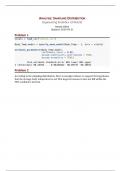
Statistics: Sampling Distribution
includes Rstudio code that imports data, creates a model of the data, estimates the models parameters with specific confidence interval, calculates error in model, makes a conclusion
- Other
- • 1 pages •
includes Rstudio code that imports data, creates a model of the data, estimates the models parameters with specific confidence interval, calculates error in model, makes a conclusion
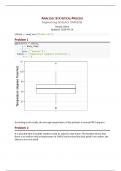
Analysis of the statistical process
Includes Rstudio code to import data, analyze data, create data plot, and make conclusion based on data.
- Other
- • 1 pages •
Includes Rstudio code to import data, analyze data, create data plot, and make conclusion based on data.
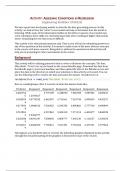
Assessing Conditions - Regression
We have spent time developing models to describe the data generating process. In this activity, we look at how the “noise” in our model can help us determine how the model is behaving. While some of the information hidden in the leftover aspects of our model may seem redundant, these skills are extremely important when working in higher dimensions where visualizing the raw data is more difficult.
- Class notes
- • 13 pages •
We have spent time developing models to describe the data generating process. In this activity, we look at how the “noise” in our model can help us determine how the model is behaving. While some of the information hidden in the leftover aspects of our model may seem redundant, these skills are extremely important when working in higher dimensions where visualizing the raw data is more difficult.
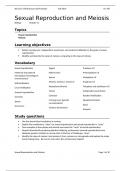
Chapter 11: Reproduction
Topics: Sexual reproduction Meiosis Learning Objectives: • Relate crossing-over, independent assortment, and random fertilization to the goals of sexual reproduction. • Identify and describe the steps of meiosis, comparing to the steps of mitosis.
- Class notes
- • 10 pages •
Topics: Sexual reproduction Meiosis Learning Objectives: • Relate crossing-over, independent assortment, and random fertilization to the goals of sexual reproduction. • Identify and describe the steps of meiosis, comparing to the steps of mitosis.
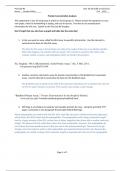
Protein Concentration Lab
1. In lab, you used an assay called the BCA assay to quantify total protein. Use the internet to summarize the basis for the BCA assay. 2. Another common colormetric assay for protein concentration is the Bradford (or Coomassie) assay. Use the internet to summarize the basis for the Bradford assay. 3. SDS-Page is a technique to separate and visualize proteins by mass. Using the provided 1977 paper, summarize in one paragraph the principle behind SDS-Page.
- Class notes
- • 1 pages •
1. In lab, you used an assay called the BCA assay to quantify total protein. Use the internet to summarize the basis for the BCA assay. 2. Another common colormetric assay for protein concentration is the Bradford (or Coomassie) assay. Use the internet to summarize the basis for the Bradford assay. 3. SDS-Page is a technique to separate and visualize proteins by mass. Using the provided 1977 paper, summarize in one paragraph the principle behind SDS-Page.
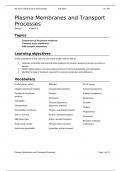
Chapter 5: Cell membrane and transport
Topics: Components of the plasma membrane Transport across membranes Bulk transport mechanisms Learning Objectives: • Calculate osmolarity and concentration gradients to classify transport processes as active or passive. • Predict which regions of transmembrane proteins will be hydrophobic and hydrophilic. • Identify the type of transport required for common molecules and substances.
- Class notes
- • 17 pages •
Topics: Components of the plasma membrane Transport across membranes Bulk transport mechanisms Learning Objectives: • Calculate osmolarity and concentration gradients to classify transport processes as active or passive. • Predict which regions of transmembrane proteins will be hydrophobic and hydrophilic. • Identify the type of transport required for common molecules and substances.
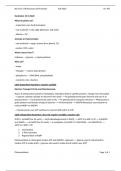
Notes on light dependent/independent reactions
Light Dependent Reactions: requires sunlight Electron Transport Chain and Chemiosmosis Light Independent Reactions: does not requires sunlight, requires CO2
- Class notes
- • 1 pages •
Light Dependent Reactions: requires sunlight Electron Transport Chain and Chemiosmosis Light Independent Reactions: does not requires sunlight, requires CO2
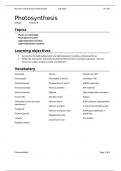
Chapter8: Photosynthesis
Topics: Plants are autotrophs Chloroplast structure Light-dependent reactions Light-independent reactions Learning Objectives: • Summarize the light-independent and light-dependent reactions of photosynthesis. • Relate the mechanism and yields of photosynthesis to that of aerobic respiration. How are these two unique reactions similar and different?
- Class notes
- • 8 pages •
Topics: Plants are autotrophs Chloroplast structure Light-dependent reactions Light-independent reactions Learning Objectives: • Summarize the light-independent and light-dependent reactions of photosynthesis. • Relate the mechanism and yields of photosynthesis to that of aerobic respiration. How are these two unique reactions similar and different?
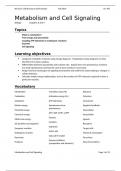
Chapter 6&9: metabolism & cell signaling
Topics: What is metabolism? Free energy and spontaneity Coupling ATP hydrolysis to endergonic reactions Enzymes Cell signaling Learning Objectives: • Categorize metabolic reactions using energy diagrams. Manipulate energy diagrams to show the effect of enzyme catalysis. • Differentiate between spontaneity and reaction rate. Explain how non-spontaneous reactions are made spontaneous and how the rate of slow reactions is increased. • Assign chemical messengers to signaling mech...
- Class notes
- • 12 pages •
Topics: What is metabolism? Free energy and spontaneity Coupling ATP hydrolysis to endergonic reactions Enzymes Cell signaling Learning Objectives: • Categorize metabolic reactions using energy diagrams. Manipulate energy diagrams to show the effect of enzyme catalysis. • Differentiate between spontaneity and reaction rate. Explain how non-spontaneous reactions are made spontaneous and how the rate of slow reactions is increased. • Assign chemical messengers to signaling mech...
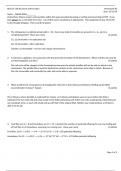
Mitosis and Meiosis Problems
7 word problems about mitosis and meiosis, answers included
- Class notes
- • 3 pages •
7 word problems about mitosis and meiosis, answers included
